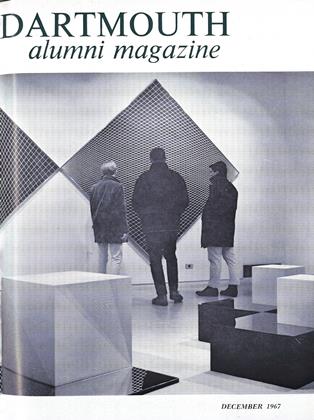Dartmouth Medical School's Department of Psychiatry has received a $287,878 federal grant to finance research in new methods of caring for emotionally disturbed persons who live far from regional health centers.
With a four-year grant from the National Institute of Mental Health a medical-sociological team will operate, between Hanover and Claremont, N. H., the nation's first community-based, closed-circuit television consultation service offered on a 24-hour basis. And simultaneously the team will work with the family practitioner in providing psychiatric treatment.
The long-distance consultation will be initiated by the local physician. After arranging the interview by telephone, he will bring his patient to the studio at Claremont (N. H.) General Hospital. Using the two-channel, closed-circuit system, the psychiatrist at the Dartmouth-Hitchcock Medical Center in Hanover and the patient in Claremont will be able to see and hear one another. The local practitioner will sit in another room and on two television screens view both his patient and the psychiatrist.
Following the interview the local physician and the psychiatrist will discuss the patient's problems, the interview, and immediate treatment plans. The patient may be asked to return for more television consultations with the psychiatrist, but no long-term treatment this way is planned.
The pilot project will bring a medical center's full range of services to Claremont, a city of 13,500 persons located 26 miles south of Hanover. There are no psychiatrists among the 24 doctors in the Claremont area.
Dr. Robert J. Weiss, chairman of the Psychiatry Department at the Dartmouth Medical School and project director, said, "It seems unlikely that sufficient psychiatric personnel will be available to staff many areas in the foreseeable future. The difficulties in staffing and providing psychiatric intervention in such areas is a problem which must be met with new methods."
Patient service under the N.I.M.H. grant is scheduled to begin no later than June 1968. Preliminary work, much of which is under way, includes building television studios in Hanover and Claremont and a micro-wave transmission system as well as collecting base-line data and planning orientation seminars for the participating Claremont doctors.
A primary objective of the Dartmouth research project is to enable family physicians to care for patients with emotional problems, eliminating the need to treat them at a distance from their homes and communities. Surveys have shown that the family doctor is often the first person turned to when emotional illness appears.
The 24-hour-a-day television consultation service at the Dartmouth Medical School will be "crisis-oriented." The concept of crisis treatment is based on the premise that chronic psychiatric disability — often involving prolonged confinement in a mental hospital - can often be prevented by early intensive intervention.
Immediate, local treatment is part of the growing field of community psychiatry. Primary stimulus has, until now, come from new community mental health centers in cities connected with large medical schools. The Dartmouth project will attempt to make modern psychiatry available to smaller cities and rural areas.
The staff of the federally sponsored project, based at Dartmouth, includes Dr. Charles Solow, a psychiatrist and co-director; Prof. Bernard J. Bergen, a sociologist; and Mrs. Charlotte Perry, a research coordinator. Their services to Claremont doctors will be free during the experiment. The local physicians will charge patients only for their own time.
The sociologist will direct the evaluation procedures necessary to assess the effectiveness of the project. Data will be assembled to indicate changes in patterns of care of emotionally disturbed patients in the area served by Claremont General Hospital. The project will also assess changes in attitudes towards emotional illness on the part of physicians and other medical personnel.
Major questions to be probed include how much one can teach the non-psy-chiatrist about psychiatry by doing the teaching around care of their patients.
Dartmouth officials hope that in 1971, when the innovative research project ends, the idea of closed-circuit consultation will spread under the sponsorship of state and local mental health agencies. Conceivably, one base station could serve many satellite hospitals.
The Claremont medical community endorsed Dartmouth's research proposal, and space is being provided by the Claremont Hospital. The local community mental health clinic also will coordinate its efforts with the project.
 View Full Issue
View Full Issue
More From This Issue
-
 Feature
FeatureFood for Alumni Thought
December 1967 -
 Feature
FeatureThe Dartmouth-Talladega Alliance
December 1967 By WILLIAM R. MEYER -
 Article
ArticleWith the Big Green Teams
December 1967 -
 Article
ArticleThe Undergraduate Chair
December 1967 By JOHN BURNS '68 -
 Class Notes
Class Notes1923
December 1967 By WALTER C. DODGE, DR. THEODORE R. MINER, TRUMAN T. METZEL -
 Class Notes
Class Notes1941
December 1967 By EARL H. COTTON, LOUIS A. YOUNG JR.
Article
-
 Article
ArticlePHI SIGMA KAPPA LEADS FOR 1924-25 SCHOLARSHIP TROPHY
August, 1925 -
 Article
ArticleSuggestions
November 1935 -
 Article
ArticleChristmas Recess
December 1948 -
 Article
ArticleA Clean Bill
June 1952 By C. E. W. -
 Article
ArticleDiplomacy's Medium
December 1979 By DAVID M. SHRIBMAN '76 -
 Article
ArticleAkron-Canton
FEBRUARY 1971 By THEODORE A. ROSSI '63

